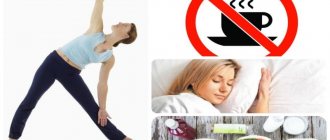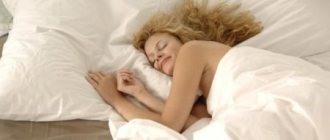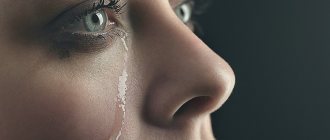The change of seasons brings pleasant variety to our lives. After sweltering summer days , the coolness is pleasant; the monotonous green of the leaves is replaced by a riot of colors. But when the leaves fall and the temperature is no longer comfortable, many feel like their battery is dead. A person is overcome by apathy and constant drowsiness . I want to eat a lot, my body requires sweets, fatty foods, fried foods, and not getting up from the couch. But no one canceled their studies or work. Constant absent-mindedness and weakness have a bad effect on work results and prevent you from studying well, making a career, or running a business. Some take vitamins or go to the doctor and get examined. It is useful to monitor your health and undergo an annual medical examination, but autumn drowsiness, if there are no other unpleasant symptoms, should not be a cause for concern. This is a natural reaction of the body to cold weather and reduced daylight hours .
Competition “Bio/Mol/Text”-2020/2021
This work was published in the “Free Topic” category of the “Bio/Mol/Text” competition 2020/2021.
The general partner of the competition is the annual biotechnology conference BiotechClub, organized by the international innovative biotechnology company BIOCAD.
The sponsor of the competition is SkyGen: a leading distributor of life science products on the Russian market.
Competition sponsor: the largest supplier of equipment, reagents and consumables for biological research and production.
"Book" sponsor of the competition - "Alpina Non-Fiction"
We often hear that social networks are to blame for everything: “Teenagers do not part with their phones, they sit on them day and night! And then they can’t wake up for school, they fall asleep in class, and because of this they study poorly. Then on weekends they sleep until noon, but the lessons won’t teach themselves. Okay, if they want to go to bed late, then let them read books, because it’s this blue light from the screens that keeps them awake for so long!”
Do you recognize the arguments? But some of them are myths, while the significance of others is exaggerated. In reality, why we sleep and how we do it at different times in our lives is a complex and contradictory story. Let's try to figure out why the sleep of teenagers and young adults is so different from the sleep of middle-aged people and children, why we don't get enough sleep all the time (even if we sleep for what seems like a sufficient amount of time), what role does the first class/first lesson at 8 play in this? :30 in the morning, and what - hanging out on social networks at night, looking at it, and let's talk about whether something can be done about all this.
Stress
If everyday worries have left their mark on mental health and prevent you from sleeping peacefully, a somnologist strongly recommends using the help of a specialist.
Important!
If you are concerned about prolonged insomnia, shallow sleep, or dissatisfaction with the quality of your sleep, you should consult a doctor.
Without hind legs: how to start getting enough sleep?
A perfect storm
The map for us will be the model of a “perfect storm” (a perfect storm, an English phraseological unit denoting an event in which a rare combination of circumstances sharply aggravates the events) (Fig. 1) [1], [2]. This is a model according to which, in adolescence, sleep is influenced by physiological and social factors: on the one hand, shifting it in time, on the other, reducing its duration. This subsequently affects well-being, mood, academic performance and can cause health problems.
Figure 1. The “perfect storm” model.
[2]
Restless legs syndrome
A condition in which a person cannot lie still is called restless legs syndrome. Involuntary twitching is observed, causing discomfort. Such sensations are accompanied by the need to make some kind of movement, usually with the legs.
Photo: istockphoto.com
The syndrome can occur in diabetic patients with damage to the nervous tissue and in patients with iron deficiency. In the latter case, dopamine synthesis is disrupted, resulting in a feeling of anxiety. For an accurate diagnosis, you should consult a specialist.
Physiological factors
With the onset of puberty, a biologically determined shift in the sleep-wake cycle occurs, with a tendency toward falling asleep later. This shift is mediated by at least two reasons.
Firstly, there is melatonin. It determines our bedtime, and its synthesis follows the circadian rhythm. As the child grows older, the peak of its secretion shifts to a later time, from approximately 10:00 pm to 1:00 am. In addition, the volume of its synthesis decreases significantly, and in girls these changes occur earlier than in young people, as does the onset of puberty [2], [3].
What circadian (aka circadian) rhythms are can be learned from the article “Biomolecules” about the Nobel Prize in Physiology or Medicine for 2021 [4].
In addition, it is melatonin that synchronizes our internal biological clock with the time of day: its secretion changes depending on the activity of the suprachiasmatic nucleus, which, receiving signals from the retina, responds to changes in ambient light. Sensitivity to evening light levels increases in early adolescence [5]. This leads to suppression of melatonin secretion and, as a consequence, a delay in falling asleep [6].
You can learn more about the work of the suprachiasmatic nucleus from the article “Biomolecules” : “Wake up!” - “Go to sleep...” - “Wake up!” - “Go to sleep...” - “Wake up!” [7].
The second reason is a delay in the phase of the sleep-wake cycle during adolescence. And this is not a disease of modern society and city residents. This phenomenon is noted regardless of the significant cultural differences in the habits of adolescents in different countries around the world [8]. In order to understand it, we first need to become familiar with the two-component model of sleep regulation (Figure 2). It is based on the interaction of two components—the circadian and homeostatic processes of sleep regulation [9], [10]. The circadian process (C-process) is rhythmic, its cycle is approximately 24 hours and is regulated by the level of light at different times of the day, the activity of the suprachiasmatic nucleus and melatonin. The homeostatic process (S-process) is associated with the accumulation of fatigue and drowsiness during wakefulness; it increases during the day and decreases during the night. Its marker is considered to be the delta index (also known as the SWA level, slow-wave activity on the electroencephalogram, EEG). In healthy people, it is maximally expressed during slow-wave sleep (NREM sleep), increases depending on the duration of previous wakefulness, and is extremely high during sleep deprivation.
Figure 2. Two-component model of sleep regulation.
[9], [10]
This “sleep pressure” (homeostatic S-process) accumulates more slowly in adolescence, which is associated, among other things, with a decrease in the peak level of melatonin and leads to a longer time to fall asleep, forcing one to stay awake at night (Fig. 3). At the same time, this “pressure” decreases in adolescents almost as slowly as in children. Thus, given the need to wake up early the next day, the 8–10 hours of sleep required for adolescents turns out to be an almost impossible condition in their usual reality [11]. It is worth noting that the listed processes increase with growing up and puberty, so high school and junior students experience the greatest difficulties with short and poor-quality sleep [12], [13].
Figure 3a. Levels and timing of melatonin secretion in adolescents at different stages of sexual development.
[12]
Figure 3b. “Childhood” and “teenage” patterns of the sleep-wake cycle. The red and blue lines are the upper and lower boundaries of the circadian process (C-process), which indicate the threshold for falling asleep and the threshold for waking up. The green line is the homeostatic process (S-process).
[13]
How exactly these features are programmed at the genetic level is still unknown, but there are studies on fruit flies. For example, the pdm3 gene was discovered, which is necessary for the formation of sleep regulation mechanisms in Drosophila. This gene encodes the protein PDM3, a transcription factor domain that coordinates the early brain development program and controls the communication of wakefulness-promoting dopaminergic neurons with the sleep-promoting region. When the pdm3 gene is knocked out, dopaminergic inhibition of the sleep center increases prematurely, its formation is disrupted, and young flies continue to stay awake when they should fall asleep, thereby not getting the required amount of sleep. There are a number of homologous genes in humans, one of them is POU6F2. In mammals, its products, the POU proteins, are associated with neurodevelopmental disorders such as autism spectrum disorder, which are often accompanied by comorbid sleep disorders, suggesting a potential role for these early life sleep regulators [14]. Thus, we have little evidence that the shift in the sleep-wake cycle is genetically determined and occurs with maturation and brain development.
You can learn about another “sleep gene” discovered in fruit flies from the 2008(!) news on Biomolecule [15].
We cannot influence all this biological machinery, but the second group - social factors, which are associated with most misconceptions and myths - is quite amenable to modification.
Is a day's rest harmful?
For a long time it was believed that it was useful. Although no large-scale studies have examined the beneficial effects of daytime naps. For example, it is unclear whether sleeping during the day can reduce the likelihood of various diseases or have a positive effect on life expectancy.
How to get enough sleep quickly?
The only thing that has been reliably revealed is that a short rest in the daytime can strengthen the immune system, increase labor productivity and improve mood.
There is a kind of reboot of the body against the background of high daily stress, both physical and emotional. You should rest for about 1.5 hours - this is the duration of 1 cycle of normal sleep.
After all, night and day rest do not differ from each other in structure, they have the same stages. It’s just that the duration and number of these stages are different. During the day, against the background of reduced levels of the hormone melatonin and surrounding stimuli (sound, light), more superficial stages of sleep occur and fewer deep ones. It is also possible to reduce the speed of falling asleep.
In addition, daytime sleep should begin at a certain period of time. So, if you allow yourself to switch off at the moment of decrease in your activity (for larks and night owls this is a different time), then waking up will become unpleasant - with a feeling of a heavy head and a feeling of lethargy.
You should not lie down “for a minute” after sunset: a short nap at this time will be accompanied by the production of melatonin and will therefore disrupt subsequent night sleep.
Social factors
As we have already figured out, from a physiological point of view, social networks and the cold light of screens associated with them are not the only culprits of late bedtime. Of course, an active social life attracts our attention to countless chats, but it is not entirely clear: this is the reason for going to bed late or a way to fill the time in which, on the one hand, you are no longer productive enough to study, and on the other, not yet so Do you want to sleep to put off all your work? In addition, there is no consensus in the scientific community about which element of sleep hygiene has the greatest impact, and therefore there are no direct recommendations from international sleep medicine and pediatric organizations regarding the use of gadgets before bed [16], [17].
Other social factors that influence teens' sleep include academic workload and peer pressure. For some, it may be the fear of failing an upcoming exam, forcing them to study all night long; for others, it may be difficult relationships with teachers or classmates that are disturbing and do not allow them to sleep. In both cases, a vicious circle is formed: problems at school can lead to anxiety, insomnia and lack of sleep, which, in turn, reduces cognitive function the next day, adds irritability and impulsivity, and therefore new problems appear that interfere with sleep.
Another factor (it can be called sociobiological) is the consumption of caffeine in general and coffee in particular. In the eyes of many teenagers, this is one of the ways to appear older by drinking a kind of “growing up drink.” But for teenagers, the daily caffeine intake is much lower than for adults; it is easy to exceed it, focusing on parents, and as a result - tachycardia, hand tremors and increased anxiety, which in no way contribute to healthy sleep [18].
Above we mainly talked about going to bed late. But its duration is limited by the time at which we need to wake up, and few of us do this without an alarm clock (and more often than not without several at intervals of “five more minutes”). The first and main requirement of society for teenagers - studying at school, college or university - is inextricably linked with the early time of waking up (at 6-7 in the morning) for the first lesson. This mismatch between the physiological need for a particular sleep-wake schedule and social demands is the cause of chronic sleep deprivation, the “perfect storm” that plagues adolescents every day and every night. In the evening, sleep is interrupted by minutes of delay in the phase of the sleep-wake cycle, a slow increase in sleep pressure, social and academic problems, and in the morning by the early start of classes, which makes healthy sleep (one of the basic human needs!) unattainable.
The graph shows a strict limitation of sleep time by social factors (Fig. 4) [19]. With the onset of adolescence, sleep time on Saturday and Sunday begins to differ significantly from that on weekdays: getting up and falling asleep later, sleeping longer on weekends is not a sign of laziness, but an attempt to enter a biologically necessary mode after lack of sleep during the work week. And this attempt is not very successful: two nights of full sleep are simply not enough for recovery. The study, conducted by researchers at the Center for Cognitive Neuroscience in Singapore, involved adolescents who slept 9 hours each in the first control week, 5 days of 5 hours each in the second test week, and then 2 days of 9 hours each, reproducing weekdays and weekends [ 20]. Over 5 “weekday” days, the delta index increased and did not return to its original level. As a result, with this regime, lack of sleep becomes chronic with all the ensuing consequences, which we will talk about later.
Figure 4. Average bedtime and wake-up times on weekdays and weekends by age. Adolescents and young adults make up for the sleep time strictly limited by social factors on weekdays on weekends.
[19]
Research on long sleep
Is it harmful to sleep a lot? Recent studies on the optimal duration of deep rest have found that 7–7.5 hours of sleep per day is quite enough for normal well-being. Regarding 8 hours of deep sleep, scientists say that it is not only useless, but can also be harmful to health
A similar conclusion was made based on a study conducted among people of different ages. Participants assessed their well-being several times a day - in the morning and several times in the afternoon. It turned out that men and women who had 8 hours (or more) of sleep were significantly more likely to complain about difficulty concentrating, memory difficulties, and headaches than those whose rest lasted 7–7.5 hours.
In addition, the researchers found that prolonged sleep rest and early mortality have a direct correlation.
Consequences
Clearly, chronic sleep deprivation is a serious problem for both individuals and society as a whole. If you don't solve it, what consequences will it lead to?
I think many are familiar with the short-term ones: drowsiness, problems with performance, bad mood, sometimes anxiety, aggressiveness and impulsiveness [21], [22]. The relationship between mood and sleep is complex and bidirectional because low mood and anxiety can exacerbate insomnia and vice versa [23]. In addition, depressive symptoms can sometimes be improved by increasing sleep duration [24]. Also, with a lack of sleep, criticism of one’s own state and the ability to control emotions decrease, which leads to risky behavior [25–28].
In the longer term, lack of sleep can lead to hormonal imbalance, which, along with overeating, can lead, for example, to obesity - due to increased synthesis of ghrelin, which increases appetite (another episode with another pack of chips?), to type 2 diabetes mellitus , cardiovascular diseases [29–31]. Problems with learning and memory are common—and may be related to the volume of gray matter in the hippocampus (a brain structure traditionally associated with memory processes). In a study of healthy children and adolescents, hippocampal volume was positively correlated with sleep duration [32]. In old age, the risk of dementia increases because it is during sleep that the brain most actively gets rid of metabolic waste products, including beta-amyloid and tau protein, which are associated with neurodegenerative diseases.
You can read more about the connection between sleep and intellectual decline in the Biomolecules “Sleep and Aging II: How does the sleep of the elderly and sick differ from the sleep of the young and healthy?” [33], and about the glymphatic system, which plays an important role in this, in the Naked Science article.
It is unlikely that there will be a person who wants to experience even part of the palette of these consequences for himself, although this list is still far from complete. However, this is exactly the picture we bring ourselves closer to every evening by staying up late and then getting up at 6 am to study or work.
The most important
To never experience sleep disorders, you need to lead a normal lifestyle. Before going to bed, do not be tempted by a cup of coffee or a glass of something stronger. Ventilate the bedroom properly and maintain a temperature of 18–20°C. It is beneficial to get adequate physical activity throughout the day. You can use various relaxation techniques.
Let all everyday difficulties remain in the outside world, and the horrors of news broadcasts can be seen the next morning, if you really want to. By the way, eating stewed vegetables calms and prepares the body for rest. In general, the main thing is to achieve a reduction in the level of anxiety, and proper rest is ensured.
Help yourself
While it is still possible to find a job that you can come to at a comfortable time, rescheduling your first lesson at school is, unfortunately, more difficult. Therefore, taking care of their own health (mental and physical) falls on the shoulders of adolescents themselves. The first thing to remember is sleep hygiene, which, fortunately, has been talked about a lot lately. Here are some principles:
- regular daily routine (same time of going to bed and waking up);
- avoiding bright, cold light half an hour before bedtime. Now on many phones you can set up an evening mode - a warmer and dimmed screen light will turn on automatically at the same time;
- Wake up at the first alarm and immediately turn on bright lights. Sleeping for five minutes does not add vigor.
These small changes can make your life easier and make waking up in the morning a little less unbearable. But there is hope that one day measures will be taken at the global level. For example, in the USA there is a social movement Start School Later in support of later start of classes for high school students [34]. If for our country 8:30 is the standard start time for classes, then in America classes can start even at 7:55! Recently, California passed a law according to which, gradually, by July 2022, classes in all schools will begin no earlier than 8:30.
Diagnostics
If you constantly want to sleep and feel weak, you should first look for the reasons yourself.
Checklist for self-control:
- How long do you sleep?
- What are the sleeping conditions: light, noise, fresh air?
- Is there dinner, gadgets or TV 2 hours before bed?
- Is there physical activity? If so, isn't there a lot of it?
- How many simple carbohydrates are in your diet?
- Are there any bad habits?
If there is something wrong with the conditions, you need to correct it and observe for 2-3 weeks. If there is no improvement, consult a therapist.
List of examinations:
- general blood analysis;
- analysis of the level of vitamins B, D and C;
- analysis of free T3 and T4 content, TSH.
You need to go to your therapist with the test results. He will evaluate them, select therapy or refer them to a specialist for further examination and clarification of the diagnosis.
Dear patients! Remember that only a qualified doctor can make an accurate diagnosis, determine the causes and nature of the disease, and prescribe effective treatment. You can make an appointment with our specialists or call a doctor at home by calling 8-(4822)-33-00-33
Be healthy and happy!











